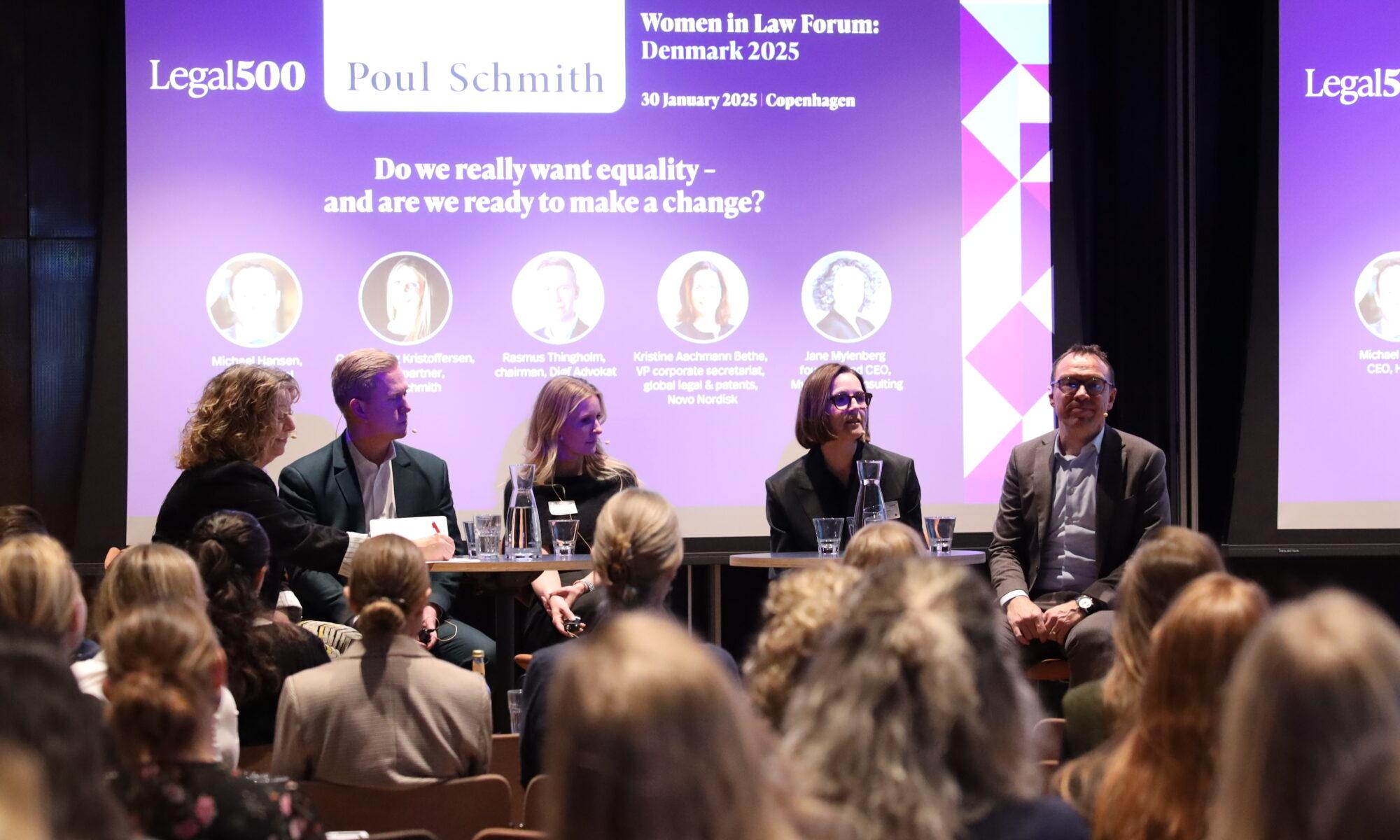Event Report
In the backdrop of Copenhagen, the Women in Law Forum Denmark 2025 brought together legal professionals, corporate leaders, and academics for an insightful discussion on gender diversity and inclusion in the legal sector. Hosted by The Legal 500 in collaboration with Poul Schmith, the event aimed to explore the evolving landscape of female representation, generational shifts in workplace dynamics, and the role of allyship in fostering a more inclusive profession. Through thought-provoking discussions and expert panels, attendees engaged in meaningful dialogue on the challenges and opportunities that lie ahead.
The forum began with a welcome address by Jens Bødtcher-Hansen, Managing Partner at Poul Schmith, who emphasised the importance of addressing gender balance in law firms and the need for structured efforts to create lasting change. He underscored how diversity in the workplace not only promotes fairness but also drives innovation, collaboration, and overall business success.
The first talk explored the gender gap in large Danish law firms, led by Maiken Toftgaard and Ronnie Kandler, both equity partners at Poul Schmith. They highlighted the importance of leadership commitment, the implementation of mentorship and sponsorship programs, and the necessity of fostering a workplace culture supporting women’s career progression. They stressed that achieving gender balance is not simply a policy matter but requires active participation from all levels of an organization to create an environment where women can thrive and advance.
Another expert talk addressed by Poornima Luthra, founder of TalentED and a leading academic at CBS, provided an in-depth analysis of generational differences in the legal profession. She examined the interplay between Generation X, Millennials (Generation Y), and Generation Z, outlining how each cohort brings distinct expectations to the workplace. Generation X professionals, often skeptical of traditional workplace structures, pioneered the shift toward work-life balance and remote work, while Millennials, raised by highly involved parents, value structured career paths and ongoing feedback. Generation Z, on the other hand, prioritises social justice, representation, and diversity in leadership, viewing technology as an essential aspect of their professional and personal lives. She highlighted how this latest generation demands workplaces that genuinely reflect their values, pushing organisations to be more inclusive and purpose-driven.
Luthra also explored the biases that shape workplace dynamics, including stereotypes such as the “strawberry generation,” often perceived as fragile under pressure, and the “trophy generation,” criticised for being rewarded for mere participation. She challenged these assumptions, arguing that each generation adapts to the circumstances in which they are raised. She also discussed the ideological gap between men and women in Generation Z, where young women tend to be more liberal, while young men often lean toward more conservative views. This divergence, she noted, necessitates a more nuanced approach to workplace inclusivity that takes into account different perspectives and experiences.
A key theme in her address was the concept of allyship, a term that originated in military contexts and later evolved within the LGBTQ+ advocacy movement in the 1960s. She underscored the importance of moving beyond passive support to active engagement in fostering inclusivity. She urged attendees to examine their own biases and expand their networks beyond individuals who share their views, emphasizing the value of engaging with opposing perspectives. She highlighted how biases, often unconscious, shape workplace interactions and can be embedded in casual remarks, humor, and decision-making processes. By acknowledging and addressing these biases, organizations can create a culture where diverse voices are truly heard and valued.
The final panel discussion, moderated by Jane Mylenberg, CEO of Mylenberg Consulting, explored whether organisations are genuinely ready to implement the structural changes necessary to achieve gender equality. Panelists shared insights into the challenges of translating policy into action. They debated the role of leadership in driving change, the importance of setting measurable diversity goals, and the resistance that often arises when traditional power structures are challenged.
The defining feature of this forum was the public’s consistent engagement in asking questions.
It concluded with a dynamic networking session, allowing attendees to connect, exchange ideas, and discuss actionable strategies for advancing gender diversity within their respective organizations. The Women in Law Forum Denmark 2025 reaffirmed the need for ongoing dialogue and commitment to fostering a more inclusive legal profession. By bringing together thought leaders and professionals from across the industry, the event provided a platform for sharing best practices and inspiring tangible steps toward greater gender equity in law.

